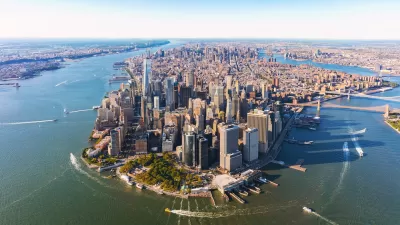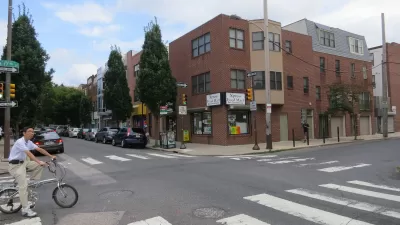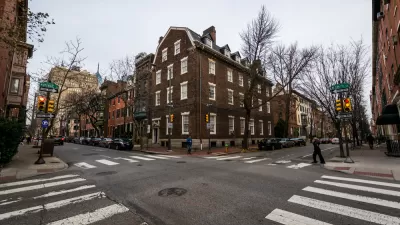Philadelphia's green roof law allows developers to build 25 percent more units if they put a green roof on their buildings. Councilmember Squilla wants to exempt his district from that law.
Philadelphia Councilmember Mark Squilla's opposition to green roofs, density, and electric cars, stands in contrast to his professed commitment to sustainability, Inga Saffron argues in a piece for the Philadelphia Enquirer. "Since the beginning of April, Squilla has pushed through two separate bills that compromise the city’s ability to cut its carbon use and contain flooding from precisely the kind of heavy weather he was personally experiencing," Saffron writes. These include a bill that took parking spaces away from electric vehicles and a new one that looks to end a green roofs incentive for Society Hill.
"Like many older cities, Philadelphia is stuck with an antiquated sewer system that has trouble handling big rainstorms. To keep the overburdened pipes from discharging untreated water into the city’s rivers, the Philadelphia Water Department encourages people to install green roofs," Saffron writes. To that end, the city's zoning code allows developers build a quarter more units in buildings outfitted with green roofs, Squilla is trying to exempt his district from that rule. A strange position for councilman to take after speaking at an Earth Day march about the importance of sustainability.
FULL STORY: Why is Councilman Squilla helping Society Hill skirt its environmental obligations?

Trump Administration Could Effectively End Housing Voucher Program
Federal officials are eyeing major cuts to the Section 8 program that helps millions of low-income households pay rent.

Planetizen Federal Action Tracker
A weekly monitor of how Trump’s orders and actions are impacting planners and planning in America.

Ken Jennings Launches Transit Web Series
The Jeopardy champ wants you to ride public transit.

Crime Continues to Drop on Philly, San Francisco Transit Systems
SEPTA and BART both saw significant declines in violent crime in the first quarter of 2025.

How South LA Green Spaces Power Community Health and Hope
Green spaces like South L.A. Wetlands Park are helping South Los Angeles residents promote healthy lifestyles, build community, and advocate for improvements that reflect local needs in historically underserved neighborhoods.

Sacramento Plans ‘Quick-Build’ Road Safety Projects
The city wants to accelerate small-scale safety improvements that use low-cost equipment to make an impact at dangerous intersections.
Urban Design for Planners 1: Software Tools
This six-course series explores essential urban design concepts using open source software and equips planners with the tools they need to participate fully in the urban design process.
Planning for Universal Design
Learn the tools for implementing Universal Design in planning regulations.
Heyer Gruel & Associates PA
Ada County Highway District
Institute for Housing and Urban Development Studies (IHS)
City of Grandview
Harvard GSD Executive Education
Toledo-Lucas County Plan Commissions
Salt Lake City
NYU Wagner Graduate School of Public Service





























